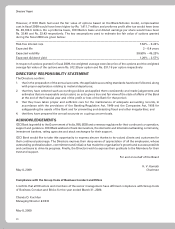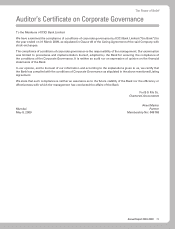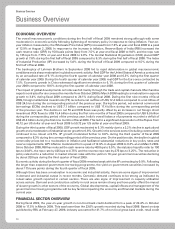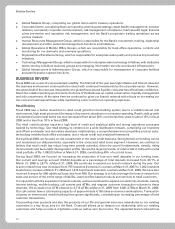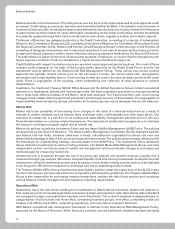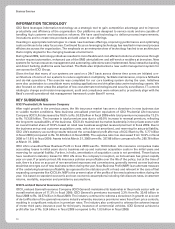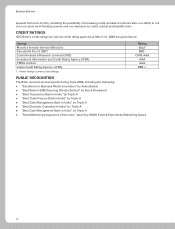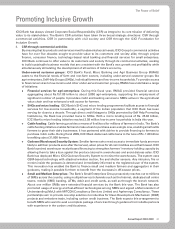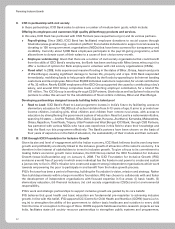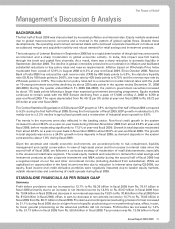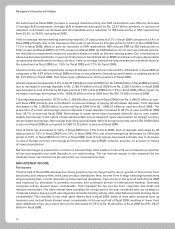ICICI Bank 2009 Annual Report Download - page 40
Download and view the complete annual report
Please find page 40 of the 2009 ICICI Bank annual report below. You can navigate through the pages in the report by either clicking on the pages listed below, or by using the keyword search tool below to find specific information within the annual report.
38
Business Overview
INFORMATION TECHNOLOGY
ICICI Bank leverages information technology as a strategic tool to gain competitive advantage and to improve
productivity and efficiency of the organisation. Our platforms are designed to service scale and are capable of
handling high customer and transaction volumes. We have used technology to deliver process improvements,
innovations and to create new products and add value to our offerings.
Investing in appropriate technologies to create new business offerings, improving performance and optimising
costs continues to be a key focus area. Continued focus on leveraging technology has resulted in improved process
efficiencies across the organisation. The emphasis on an enterprise view of technology has led to an architecture
that is highly aligned to the changing business environment.
During fiscal 2009, technology initiatives resulted in more flexible and cost-efficient solutions and services through
service request automation, enhanced use of the SMS alert platform and self-service enablers at branches. New
systems for human resources management and automating collections were implemented. New interactive banking
and direct banking platforms were launched. The Bank also implemented a new audit management system for
use across the ICICI Group.
Given the fact that many of our systems are used on a 24x7 basis across diverse time zones we initiated a re-
architecture of some of our systems to reduce application multiplicity, facilitate maintenance, improve fallbacks
and de-risk operations. This exercise was completed for our core banking system during the year. Initiatives
were also undertaken to consolidate many existing applications and virtualise data centre technology assets. We
also focused on other areas like adoption of low cost alternate technologies and security surveillance. IT controls
relating to change and incident management, audit and compliance were enhanced to proactively align with the
Bank’s overall operational risk management framework under Basel II norms.
KEY SUBSIDIARIES
ICICI Prudential Life Insurance Company
After rapid growth in the previous years, the life insurance market has seen a slowdown in new business due
to volatile market conditions. New business annualised premium equivalent of ICICI Prudential Life Insurance
Company (ICICI Life) decreased by 18.6% to Rs. 53.02 billion in fiscal 2009 while total premium increased by 13.2%
to Rs. 153.56 billion. The increase in total premium was due to a 60.5% increase in renewal premium, reflecting
the long-term sustainability of the business. ICICI Life maintained its market leadership in the private sector with
an overall market share of 10.9% based on retail new business weighted received premium in fiscal 2009. Due to
the business set-up and customer acquisition costs, which are not amortised, and reserving for actuarial liability,
ICICI Life’s statutory accounting results reduced the consolidated profit after tax of ICICI Bank by Rs. 5.77 billion
in fiscal 2009 (compared to Rs. 10.32 billion in fiscal 2008). The expense ratio has decreased from 14.9% in fiscal
2008 to 11.8% in fiscal 2009. Assets held at March 31, 2009 were Rs. 327.88 billion compared to Rs. 285.78 billion
at March 31, 2008.
ICICI Life’s unaudited New Business Profit in fiscal 2009 was Rs. 10.04 billion. Life insurance companies make
accounting losses in initial years due to business set-up and customer acquisition costs in the initial years and
reserving for actuarial liability. Further, in India, amortisation of acquisition costs is not permitted. These factors
have resulted in statutory losses for ICICI Life since the company’s inception, as its business has grown rapidly
year on year. If properly priced, life insurance policies are profitable over the life of the policy, but at the time of
sale, there is a loss on account of non-amortised expenses and commissions, generally termed as new business
strain that emerges out of new business written during the year. New Business Profit (NBP) is an alternate measure
of the underlying business profitability (as opposed to the statutory profit or loss) and relevant in the case of fast
expanding companies like ICICI Life. NBP is the present value of the profits of the new business written during the
year. It is based on standard economic and non-economic assumptions including risk discount rates, investment
returns, mortality, expenses and persistency assumptions.
ICICI Lombard General Insurance Company
ICICI Lombard General Insurance Company (ICICI General) maintained its leadership in the private sector with an
overall market share of 11.2% in fiscal 2009. ICICI General’s premiums increased 3.3% from Rs. 33.45 billion in
fiscal 2008 to Rs. 34.57 billion in fiscal 2009. The industry continued to witness a slowdown in growth on account
of de-tariffication of the general insurance industry whereby insurance premiums were freed from price controls,
resulting in a significant reduction in premium rates. The industry also continued to witness the adverse impact
of motor third party insurance pool for third party insurance of commercial vehicles. ICICI General achieved a
profit after tax of Rs. 0.24 billion in fiscal 2009 compared to Rs. 1.03 billion in fiscal 2008.


